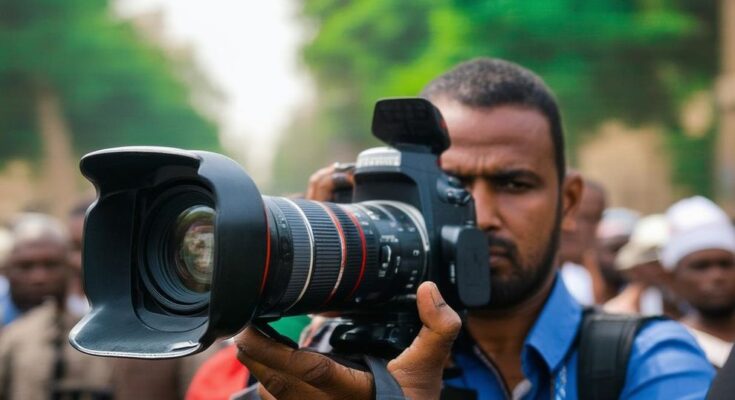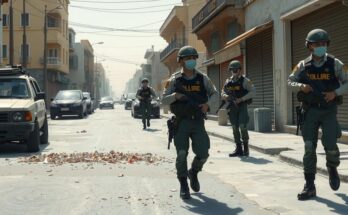Reporters Without Borders has appealed to Egypt to halt the deportation of four Sudanese journalists detained since September. The journalists are at risk of severe reprisals if returned to Sudan, which has become increasingly dangerous for media professionals amid ongoing conflicts. The organization calls for their release and the guarantee of their protection, citing violations of their rights as journalists.
Reporters Without Borders, an international advocacy group for journalism and press freedom, has urged the Egyptian authorities to stop the impending deportation of four Sudanese journalists. These individuals were apprehended in September and are currently held at a refugee center in Aswan, located at the border between Egypt and Sudan. The organization is calling for their immediate release and protection due to the dangers they face if returned to Sudan, a country known for its hostile environment for journalists. The four journalists, whose identities remain undisclosed, were taken into custody on September 23 while conducting an interview with Mohamed Hassan Bouchi, a Sudanese human rights activist who is in exile in Egypt. They had fled Sudan, seeking asylum due to ongoing violence and abuses committed by conflicting factions in their home country. These journalists possess temporary asylum seeker cards issued by the United Nations High Commissioner for Refugees (UNHCR) and have been navigating complex legal challenges since their detention. Their fate has fluctuated between the threat of deportation and the possibility of relocation to a safer nation such as Uganda. Recent developments have intensified their predicament; on October 22, the journalists were transferred to a military prison in Aswan to facilitate their expedited deportation. Iqbal Ahmed Ali, their attorney, expressed concern regarding the treatment of the journalists, stating that their status as journalists may be working against them. After nearly a month in detention, Ali noted a disconcerting lack of coordination between the UNHCR and Egyptian officials. Jonathan Dagher, the Head of the Middle East Desk at Reporters Without Borders, emphasized the critical need for the journalists’ release. He stated: “These four refugee journalists should not be detained or deported for doing their jobs: covering a war they can no longer document from their home country due to the imminent danger to their lives. Sending these media professionals back to Sudan would not only constitute a flagrant violation of their right to safety but would put them in grave danger, given the reprisals they would be exposed to. We call on the Egyptian authorities to halt the deportation procedure. These journalists must be released and their protection guaranteed.” Despite Sudan ranking 149th on the World Press Freedom Index, Egypt is positioned even lower at 170th. The bleak media landscape in Sudan, exacerbated by ongoing conflict, has resulted in extreme risks for those attempting to report on the situation. Rashid Saeed, the Team Leader at Radio Dabanga, highlighted these dangers during a recent panel discussion, noting the widespread destruction of media infrastructure and the violent targeting of journalists since the conflict commenced in April 2023. The situation underscores the vulnerabilities faced by journalists in regions ravaged by conflict and the urgent need for protective measures to ensure their safety and the freedom of the press.
Currently, journalists in conflict zones face increasing threats to their safety and freedom. The situation in Sudan has significantly deteriorated, leading many journalists to flee the country in search of asylum. The challenges faced by those attempting to complete their work under oppressive conditions are compounded by bureaucratic obstacles in host countries, such as Egypt. Advocacy groups like Reporters Without Borders are actively working to highlight and combat the legal and administrative challenges faced by these individuals. The plight of the detained Sudanese journalists exemplifies broader issues related to the safety of journalists worldwide, emphasizing the need for international intervention and support.
The call by Reporters Without Borders for Egypt to suspend the deportation of Sudanese journalists illustrates a significant intersection of press freedom and human rights. The threats these individuals face should they be returned to Sudan are stark, highlighting both the perilous landscape for journalists in conflict zones and the critical need for protective measures by host nations. With the ongoing conflicts and systemic risks faced by media professionals, it is imperative that international organizations and governments uphold their commitment to safeguarding freedom of the press and ensuring the safety of those dedicated to reporting the truth.
Original Source: www.dabangasudan.org




